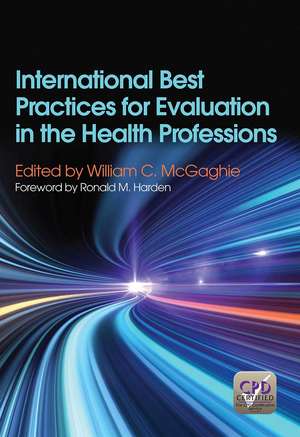International Best Practices for Evaluation in the Health Professions
Autor William Mcgaghieen Limba Engleză Paperback – 21 ian 2013
Preț: 450.74 lei
Preț vechi: 540.87 lei
-17% Nou
Puncte Express: 676
Preț estimativ în valută:
86.26€ • 93.67$ • 72.46£
86.26€ • 93.67$ • 72.46£
Comandă specială
Livrare economică 01-15 aprilie
Doresc să fiu notificat când acest titlu va fi disponibil:
Se trimite...
Preluare comenzi: 021 569.72.76
Specificații
ISBN-13: 9781846195150
ISBN-10: 1846195152
Pagini: 400
Ilustrații: illustrations
Dimensiuni: 305 x 152 x 27 mm
Greutate: 0.77 kg
Ediția:1 New ed.
Editura: CRC Press
Colecția CRC Press
ISBN-10: 1846195152
Pagini: 400
Ilustrații: illustrations
Dimensiuni: 305 x 152 x 27 mm
Greutate: 0.77 kg
Ediția:1 New ed.
Editura: CRC Press
Colecția CRC Press
Public țintă
Academic, Professional Practice & Development, and Professional ReferenceCuprins
Foreword. Preface. About the editor. List of contributors. Evaluation in the health professions: history and current practice. Criteria for a good assessment. Technology-enabled assessment of health professions education. Research on assessment practices. Assessment for selection for the health care professions and specialty training. Clinical competence assessment. Evaluation of knowledge acquisition. Assessment of professionalism. Best practices in measuring healthcare team performance. Evaluating outcomes in continuing education and training. Culture, medical education and assessment. Workplace based assessment. An international review of the recertification and revalidation of physicians: progress toward achieving best practices. Evaluation of health professions leadership and management and programs that teach these competencies. Evaluation for program and school accreditation. Looking to the future. Index.
Notă biografică
Dr. McGaghie is the Jacob R. Suker, MD, Professor of Medical Education and Professor of Preventive Medicine at the Northwestern University Feinberg School of Medicine in Chicago, Illinois, where he has served since 1992. Dr. McGaghie's research and writing in medical education and preventive medicine ranges widely, including such topics as personnel and program evaluation, research methodology, medical simulations, attitude measurement, medical student selection, concept mapping, curriculum development, faculty development, standardized patients, and geriatrics. Dr. McGaghie has authored or edited eight books and has published more than 250 journal articles, textbook chapters, and book reviews in health professions education, simulation- based education, preventive medicine, and related fields.
Descriere
This unique text presents a comprehensive narrative on why and how health professions students need to be evaluated for practice in the 21st century. It systematically addresses current evaluation best practices in the health professions to identify today’s evaluation benchmarks, reveal evaluation limits, address improvement pathways, and map a research agenda to boost future evaluation practices.
